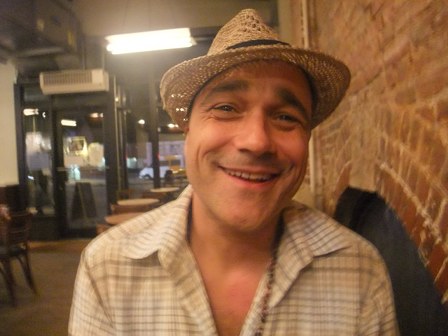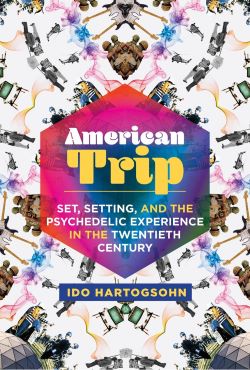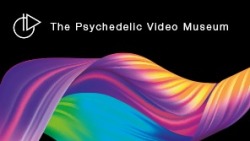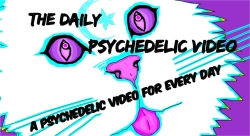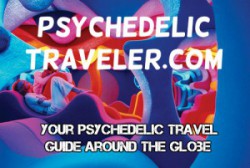The Chosen People of Iboga: A Conversation with Dimitri Mobengo Mugianis
Originally Published in Reality Sandwich.
By the time Dimitiri Mobenga Mugianis reached 40 years of age, he was ready to die. After cultivating an ever-worsening cocaine and heroin habit, the Detroit born and raised artist, poet and activist had just lost his wife, who died of an heroin overdose while pregnant.
Mugianis had been active in Manhattan’s Lower East Side artistic and political scene during the eighties and nineties, while keeping a habit, and had by that time lost all sense of purpose in his life. He had gone back to Detroit and was living in his parents’ basement, spending his days shooting drugs.
“There was no more fun. I was just really wasted and defeated. I was ready to die” says Mugianis, “and I really wanted to. My only goal when I was turning 40 was to go to Greece and then come home and die.”
Dimitri’s first journey to his ancestors’ homeland was already set, however following a lead he got from a fellow junkie friend, he decided to stop in Amsterdam on the way, and make a last attempt to kick his habit. There he would visit a Dutch woman by the name of Sarah, who was known to treat junkies using a then little-known, highly powerful hallucinogenic African root called Iboga.
“I had first heard about Iboga years earlier, in 1989, through my friend Adam Nodelman who came to New York with his wife at the time” tells Dimitri. “Adam was a musician and politically active in anarchist circles. His wife, who was a Dutch woman, was involved in the junkie movement, and they were telling me about their experiences with the Junkie Union in Holland. We were shooting together and they told me that they had gone through with the Iboga thing and that it was amazing. Clearly, they had relapsed, but they had gone through it and it was amazing. They told me stories about it, and this kind of stuck with me in the years ahead.”
Harlem Shaman
Cut to NYC, August 2011. I am visiting Dimitri in the New York Harm Reduction Experts center in Harlem, where he invited me to join one of the weekly shamanic Bwiti (Gabonese Iboga religion) influenced ceremonies he has been organizing in Harlem for the neighborhood’s junkies and vagabonds during the past months.
Things were supposed to turn out differently for Dimitri. He was supposed to be in Costa Rica at the moment, starting the “most amazing Iboga clinic in the world,” but a few days before he was ready to leave the country, he was arrested for possession of Ibogaine, a schedule I drug in the US, and spent 24 hours in jail, his first time there in the decade since he had stopped being a junkie and started treating people with Iboga. His passport had been taken from him and he was forbidden to leave the US until further notice, waiting for authorities to make a decision in his case.
Dimitri prefers to look at the bright side, though. The predicament gave him a chance to do much needed spiritual work in one of Manhattan’s roughest parts. “Bwiti took away my Iboga so I can become a better shaman. Bwiti took away my passport so I have to stay in one place. Bwiti put me in a jail cell and made me claustrophobic so I have to meditate. I’m grateful to Bwiti for putting me there, because I got to see again what they fucking do to people. It is a sin, a crime, to take away the sunshine from somebody. These people haven’t seen the sunshine for two years. That is really unjust.”
“What happened was a great opportunity for transformation, and I’m incredibly grateful” he says, and even though it sounds absurd, coming form his mouth I can almost believe it.
A few days before, in the NYHRE, about 20 junkies are gathered together in the middle of the day to perform a shamanic ceremony in a small candle-lit room. After 15 minutes of silent meditation, Dimitri and his close friend and coworker Bovenga are now singing Bwiti songs and consecrating the space using burning ritual herbs. Dimitri is dressed in ceremonial clothing. A majestic feather is attached to his forehead. He and Bovenga paint the faces of those in the room glowing colors, moving from one person to the other, and blessing them, while the junkies play the maracas and other musical instruments which were laid on the table at the center of the room.
Reminiscent of indigenous power plants ceremonies, but grounded in Harlem’s harsh reality, the whole scene seems highly surreal at first, like straight out of an particularly bizarre Burroughs novel. The people here are homeless. Many are drug users, many of them fresh out of jail. Many of them are HIV positive. However, after a few minutes, the initial peculiarity of the scene recedes to the background, and another thing becomes clear: in the harsh reality of Harlem, Dimitri is bringing hope, love and compassion to people whose lives had been strewn with alienation and pain.
This is a struggle of mythical proportions between the heaven and the earth, between the good and bad in everyone’s soul, and Dimitri is the urban shaman, toiling at the extraction of all demons and the healing of all souls. He prances around the room addressing the gods and the hearts vehemently, making passionate speeches about the importance of pleas, intentions and prayers. He calls to the spirits of the Bwiti to come and cure the people in the room. His charisma and big heart wipe away all differences. “Many shamans that suffered from a particular disease know it better than anybody else. So this is my malady that I work with,” he says. People here respect Dimitri because they know that he knows the demons of drug addiction from first hand experience.
This doesn’t mean that everything is nice and easy, of course. Tensions erupt at one point of the session, and one of the participants decides to leave the room, something which Dimitri says hasn’t occurred before. However, by the end of the session, after singing and praying together, this small and seemingly highly improbable community of people led to God in the quest of inner strength looks united and in peace.
Before closing the session, Dimitri has a sad message. One of the group members had died the previous week of a heroin overdose. Death is ever-present, here, as it is around the world of Iboga drug treatment in general. A few days later, when I meet Dimitri near the Yippie Museum Café on the Lower East Side, he tells me that a friend of his, an Iboga provider (the term for Iboga therapists in the community) who has spent the last couple of years repeatedly going back and forth between Iboga and the needle, has finally died of an heroin OD.
These kinds of events make some of Iboga’s opponents dubious about the Iboga treatment, but for Dimitri a relapse doesn’t mean that treatment hadn’t succeeded or that an Iboga experience was any less valid than in the case of former users who were permanently healed of their addiction.
“If success means stop using for ever, well then I don’t care about that. I think everyone who comes to contact with Iboga is profoundly changed. One of those changes is more satisfaction for them and the outside society.”
“I stopped using heroin and that’s great, but there are plenty of folks who continue to use and still have amazing changes happen in their lives. I’m still working on my first experience 9 years ago.”
Dimitri’s line of argument runs even deeper though. His idea of healing is fundamentally different than that of the mainstream medical establishment, and based in an entirely different weltanschauung. “The psychiatrist and the scientist want to measure everything, but they cannot measure love. That is not quantifiable.” He goes on to tell me the story of Marcus, a homeless addict who was one of his first Iboga patients.
Marcus had a horrendous, extremely difficult experience and disappeared completely during the second day of treatment, while Dimitri was resting and to his utter devastation.
“Two weeks later I was sitting in the park and Marcus comes to me. He was wearing the same t-shirt. He did things for money he wasn’t proud of. He also had a bunch of CD’s under his arm that he obviously had stolen. He was limping through the park, just looking terrible. I was running to him. I was almost crying when I saw him. He threw his arms around me and said: “Thank you Dimitri. You changed my life.”
“So who are we to say that it didn’t change Marcus’s life? Who are we to call him a failure? When we tell people what is successful and what is not successful we set people up against failure. Emma Goldman said that everyone has a right to beautiful and radiant things. So did Marcus, and so does every street junkie out there.”
The Path of Bwiti
Gabon, the home of Iboga and the Bwiti religion, has been a center of Iboga use for thousands of years. Although reliable data on the subject is lacking, Dimitri estimates that about 300 thousand of the 1.5 million inhabitants of Gabon participate in Bwiti ceremonies, events which involve the ingestion of the Iboga bark root.
“It is far more prominent than Ayahuasca in south or central America. You walk into a village and everyone knows what you know. The children eat it. The babies eat it. The old people eat it. The pregnant women eat it. The dogs eat it. Everyone eats it. It is used for different sorts of initiations, for passage into adulthood, and as medicine for many ailments.”
Gabonese Bwiti comes in many shapes and forms, which range from the Christian to the native indigenous, and encompasses a myriad of bizarre hybrids. “I have seen Bwiti where people’s faces were painted and they were wearing big pope hats with huge crosses on them, and I’ve seen Bwiti that was completely leaves and flowers. This is a way that African culture survived and changed,” says Dimitri.
Unknown in the west until the middle of the 19th century, Iboga has made its first appearance outside Africa in 19th century France, but it was only in 1962 that its anti-addictive properties were first discovered, an event which interestingly occurred in the very same place in which we Dimitri and me are sitting, the Lower East Side of Manhattan, a neighborhood that has harbored radical politics and culture since the beginning of the 20th century.
In 1962 Howard Lostof, a heroin addict who lived here, got hold of some Ibogaine, which he intended to use for recreation. After consuming the Ibogaine, Lostof was amazed to find that his desire for heroin had disappeared, as well as the horrifying withdrawal symptoms of stopping heroin use.
From that moment and to his death in 2010, Lostof fought for the recognition of Iboga as a treatment for heroin addiction. Making the case for Iboga, which has been classified as a schedule I substance in the US (a substance deemed to be of high potential for abuse, unsafe for research, and with no established medical use in treatment) hasn’t been easy. But in the past decades Iboga treatment has received increasing attention, and the enthusiastic responses by many of its patients has given it the reputation of a magic cure, a label which Dimitri decidedly objects to.
“Iboga doesn’t get anyone off a drug” says Dimitri. “That’s not what it does. It interrupts the physical dependency on drugs.”
So it’s not a wonder drug?
“It is a wonder drug, but the wonder isn’t that you walk away forever. The wonder is that you change your fucking life and your mindset, and you might go back again to being a heroin addict unless you put some work into it. It is just like with ayahuasca. It is not consumerism, not a consumerist product — but the work you put into it.”
“Look, there are a lot of Ibogaine providers who are completely fucked up. You are not going to take these things and eat them and then the world is going to be OK. Bwiti wants you to engage with it and work, and to try to live a clean life.”
“The problem is that Bwiti gives you so much power that people think it’s over. That the whole thing is over, that the spell has been lifted. You can lift the spell, but if you go back to the shit again, you are going to fall back into it. I felt the same thing. But I was lucky.”
After the addict is rid of his addiction, it is the socio-economic factor which plays a crucial role in deciding whether he will go back to his habit or not. “It all depends on where the person is going back to,” says Dimitri. “The formula I got from Ritchie, my friend that connected me with Sarah, was: you need to go to therapy, and you need to do something with your life, physical, mental, spiritual. And I stuck to it.”
The Chosen People of Iboga
The son of Greek immigrants, Dimitri grew up in a house where politics were a matter of constant debate. His parents, both politically active left wingers, have instilled in him a perpetually burning awareness of the injustices of the world.
“Growing up in a political house was sort of like growing up in a religious house, not in the sense of being dogmatic because they weren’t strict communists, but every day you would hear about what’s wrong with the world, and how you should go about the world.”
So how did you end up doing heroin?
“I was coming of age in Detroit in the seventies. Everyone I knew did drugs. My brother sold drugs. Most people who use drugs, use it and move on. I just didn’t. I had an affinity to heroin. I loved it. All my heroes did heroin. When I first started doing it, it was fucking great for a long time.”
Weren’t you worried about the risks?
“To me it was an attraction.”
However, the attraction that held up for many years eventually faded and gave way to an unrelenting habit whose clench became harder and tougher. “What I would do is about a 150 to 200 dollars worth of heroin and 100 milligrams of methadone every day. It means going to the methadone clinic 6 days a week, sometimes shooting up in parking lots or in the bathroom of the methadone clinic, shooting up cocaine and heroin at the same time. The heroin made me feel good but the cocaine made me psychotic,” recounts Dimitri in Michel Negroponte’s excellent documentary film “I’m Dangerous with Love” (2009) which tells the story of his Iboga work.
“By the time I was ready for Iboga my life was completely over. I was turning 40 years old, my wife had died pregnant from addiction, and I had a lot of anger.”
Back to 2002, when Dimitri had his first Iboga experience with Sarah, the Dutch Iboga healer.
Like many other African beliefs Bwiti is a religion that puts great stress on man’s relation to his ancestors. The Iboga session run by Sarah was of a therapeutic character: not a Bwiti ceremony, and yet Dimitri’s most profound experience was an encounter with an ancient female ancestor.
“Suddenly I was in Greece, in the Peloponnese – my mother’s side of the family. I saw this sort of image of a female being in the ground, from my mother’s lineage. A matriarch. This female, my ancestor, was saying that she has been dead for thousands of years. So long that she has become earth. I woke up [from the Iboga trip] and I was fucking grateful. It was an experience which was really life changing in many ways. Suddenly, I moved from being completely addicted to being, three days afterwards, in a point where all the desire for the drug is gone.” I met my friend Adam who happened to arrive for an Iboga treatment with Sarah at exactly the same time, and we ended up spending 10 days together running around Holland completely sober. I’ve been clean ever since.”
And there was more to Dimitri’s first Iboga experience, than just letting go of his past addiction: There was a future as well, and a heroic one, at that. “Iboga told me all this stuff, and from the moment I woke up I knew that I was going to be on a radio show called ‘this American life’. I knew that there will be a documentary about me. I knew that I would become a spokesman for Iboga.”
From that moment on, Dimitri’s life trajectory has been radically diverted towards a new mission: running around the world in the quest to save every junkie, one after the other, offering them compassion, faith and the medicine.
“My life has always been a mission, but I had changed a mission. I switched plants. I went from coca and opium (that is – poppy) to Iboga. My life has been run by plants for a long time, so now when we do a ceremony I always thank poppy and coca, because they were great. We don’t want to insult them. We just gotta move on.”
One of the things which distinguish Dimitri and makes him, in this reporter’s eyes, much more truthful and trustworthy than many other drug experts who say that there are good drugs and there are bad drugs, and a sharp line that divides the two, is that he doesn’t discard the junkie’s point of view or his experience, that he does not condescend the junkie and his choices.
Dimitri has faith in the junkie; he considers working with him “an honor.” He does not turn the junkie into a social outcast. On the contrary, he sees the junkies as a kind of chosen people – chosen by Bwiti to help spread it in the west. “If you look at the Jewish tradition or the Muslim tradition, as well as many others, it’s always about colonized slaves rising up from the lowest of the low. Spirit, God, Energy, whatever you call it, always chooses these people: in this case the pygmies and the junkies”.
“Bwiti is very smart” says Dimitri. “Bwiti said, ‘how are we going to find our way to the world?’ So, it showed it to the pygmies, who are great because they work hard and are a fun people, and the pygmies took it to other people, and then somehow it got to the Lower East Side of New York. So Bwiti turned into Iboga, which turned itself into Ibogaine, and they put it in who? In the junkies hands! Why? First of all, because a junkie is fearless and crazy. And they have no past. A junkie doesn’t own a house. They haven’t talked to their parents and children. They’ve got no fucking future. They are already fucking dead. And they already lived a spiritual existence of denial, and self flagellation and living alone, and also incredible bliss. The perfect candidates. And they are also very charming, otherwise they wouldn’t live for so long. So the qualities that turn you into a junkie are also the qualities that Iboga figured were the best. It looked all over the world and said: I will cure this. This is the philosophy or the theology of American Bwiti, or universalist Bwiti. That we the junkies are the chosen people of Iboga.”
African Healing
For many years, Dimitri has practiced a secular form of Iboga, one which does away with religious ceremonialism and instead focuses on the therapeutic effects of Iboga, without stressing its African roots and spiritual import. He gave Iboga treatments in hotel rooms, relying on the physical effects of the drug to cure his patients.
This changed radically after visiting Gabon and participating in a Bwiti ceremony for the first time. There, confronted with the Bwiti culture, a society which puts Iboga in the center of its spiritual life, and integrates it into all levels of its existence, Dimitri found out about the fundamental importance of something which has been a central concept in psychedelic theory since the 1960s: set and setting: the idea that the content and character of a psychedelic drug experience is dependent on the preparation and intention as well as on the physical, social and symbolic surroundings in which the experience takes place.
The African way just made sense in so many ways. To begin with, there was the music.
“I’m a guy from Detroit who grew up with African American people. I love black girls. I’ve been married to several. In Gabon, music was the centre of everything. This was the same music that had led me since I was a kid when I heard Motown for the first time, when I heard blues for the first time, when I heard rock & roll, and Jazz and gospel for the first time. You could hear that same music in Gabon: The music that saved my life. Like in the Velvet Underground song: ‘My life was saved by rock & roll’. My life was saved by that.”
“And they were playing right in front of me. And they were dancing all night long: The old people, the young people. What we’ve lost in our culture: dancing with old people and children. The Bwitists can heal you by dancing, just like the shipibo [tribe] will find out what is wrong with you and they will sing through the plant into you. It’s all part of what has been lost. The fact that your grandmother knew how to go and pick some leaves somewhere in the forest, or in any case, that you are not that far away from someone who could boil some shit.”
“These people could speak in front of a crowd. Everyone knows that there, because it’s the Bwiti. So there was a social form, a set and setting that was old and precise, and there was trance music of continual dancing all night long. So it was very difficult, but the framing and the setting were that you had the support of everyone.”
“Once I had experienced that I knew that it was something I had been looking for me entire life. I’ve been in music from punk to house music and jazz. I’ve been involved with musicians and artists all my life. I was a poet for a while. And here it was. The healing arts and the performing arts are not separated. They are merged. After going through the ceremony there was no way I could go back to doing Iboga treatment without a ceremony. ”
And this is where you break off with the medical model for the therapeutic use of hallucinogens?
“I don’t have that many great experiences with doctors. I don’t know what about you. I don’t want to trip with them. The medicalization of this is, I think, actually dangerous.”
“That’s why for me it makes no sense to go back into a room. I have no interest in sitting in a fucking hotel room. It’s not any fun. This is much more fun, and it’s also a lot more work. To prepare for Bwiti is much more work. We do a series of ritual baths. We do conversations. We do offerings. The ritual has evolved to become something else than the traditional way.”
The Future of Iboga
Only about 500 people have been to Gabon to eat Iboga thus far, Dimitri estimates. When I ask him if he is not worried that, as in the case of ayahuasca in South and Central America, Iboga tourism could become a massive and arguably harmful influence on the Iboga culture he seems less concerned than I had expected.
“I know that in the very small world of Iboga and Bwiti, I have a little place. So I
know that what I’m doing creates a reaction in the world, just because I’m talking to you and to other people. I look at Brazil and Peru and see the good and the real bad effects of massive people coming down there for shamanistic tourism. And one of the main people responsible for people going to Gabon right now is me. In the English speaking world, anyway. That’s not a lot of people, but it was 20 this year, and there were five last year.”
“The thing is that Iboga is much harder. It also takes much longer. There are more deaths associated with it. The physical effects are much more difficult. There is the junkie connection, and then there is the thing with Africa and Gabon.”
“I hear people who want to come to Gabon as a tourist: Good fucking luck! Because it’s not like Guatemala. It’s not like that at all. It’s not geared for anything but difficulty and malaria. Gabon is incredibly difficult and incredibly expensive.”
“Culturally and mentally Gabon is much further away than south or central America. If they say I’ll be right back and they come back in two days, they wonder why you’re upset. Also it can become incredibly ugly.”
In what way?
“Well, the scars of colonialism and post colonialism are everywhere. The westerner comes with a preconceived notion, well meaning but often with unconscious racism of the “noble savage” kind, and are often disappointed. The Gabonese are very poor, even the great Ngangas and they see us as walking ATM — so it can be very confusing and upsetting for all concerned — also the treatment of women, the poverty and the obsession with western consumerism — which is what the seeker is running from — but we must remember that our cultural imperialism is very strong witchcraft.”
“When you step into this world you need to remember that it is not all light. I think that is what many people interested in this stuff today fail to realize, is that it’s also a lot of darkness. These people who are shamans, be fucking careful with them – like you would with a lawyer or with a doctor, because there is a lot of fucking darkness. This stuff has almost killed me, several times. Everyone involved in Iboga in terms of their work suffers incredibly. It is one thing to eat it once, but it is another to start treading this path, because the shamanistic path is not a spiritual path. It is a power path. Europe is fucked, we all know that, but it had some good stuff coming off it as well, like liberation, and like this sort of self reflection. We have discovered a balance which doesn’t exist in Africa. So when you go to eat Bwiti there, be careful.”
Can you reconcile those contradictions? I mean, it sounds like it can become infuriating.
“It totally is. If you go there you will be pissed off real quick. The thing is, what are you going to do? So that’s why I don’t see Iboga happening that quickly. I see it slowly happening. I see it as a tool. A crucial tool.”
And Iboga is happening. Slowly but surely. Or as Dimitri wrote on his facebook profile this week: “Osama Bin Laden – Gone. Muammar Gaddafi – Gone. Kim Jong Il. – Gone. Dana Beal — Still Standing!”[1]
Iboga’s path to acceptance in the modern world remains strange, mysterious and full of unexpected turns, but despite an ongoing war fledged against it by law authorities in the US and beyond, Iboga treatment is getting more and more recognition through the writings of literary figures like Daniel Pinchbeck, the research of academics like Professor Kenneth Alper from the NYU Langone Medical Center, and the devout work of activists and therapists like Beal and Mugianis. The Iboga root that delivers ancient African healing to the aching lost souls of the West, brings hope that someday this troubled modern culture will discover a new-found peace of its own.
